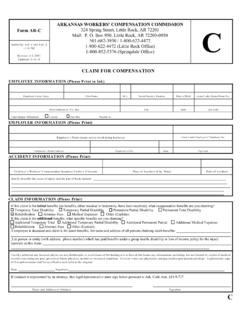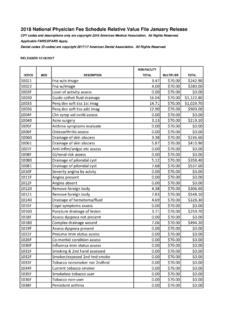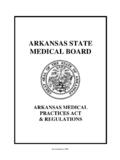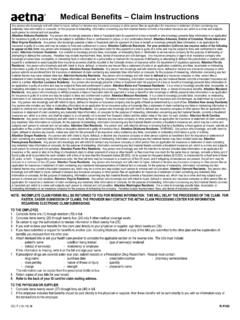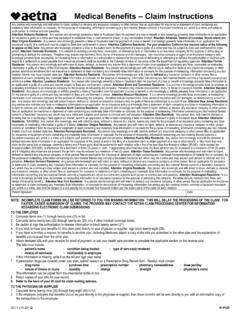Transcription of Arkansas Workers’ Compensation
1 Arkansas Workers' Compensation Questions & Answers What is Workers' Compensation ? Ark ans as' no-fault com pen sation law was c reate d by an initiated ac t in 1939 to guara ntee prom pt, automatic benefits to workers injured on the job. Before the W orkers' Com pensation Law, an injured worker had to sue the employer to recover medical costs and lost wages. Lawsuits took m onths and sometimes years. Juries and judges had to decide who was at fault and how much, if anything, would be paid. It was a costly, time consum ing and unfair system. If an employee is unable to work because of a job injury, the employer's workers' Compensation policy tak es c are o f the m edical exp ens es a nd p ays the em ployee m one y to live on until he/sh e is ab le to go back to work.
2 In most cases, these benefits are started automatically, without delay or red tape. Effective July 1, 1993, reform legislation was enacted and Act 796 of 1993 became the law for wo rkers' com pensatio n claim s. T he follo wing questio ns and answe rs concern injuries occurring after July 1, 1993. Who is covered? Almost every working Arkansan is protected by the W orkers' Com pensation Law, but there are a few exceptions. Businesses where there are two or fewer employees may not be covered. Railroad and maritime workers are covered by federal laws. The Arkansas W orkers' Com pensation Law does not apply to employment of agricultural farm labor, domestic help, or employment by non-profit, religious, charitable or relief organizations.
3 Also exempt from the law are personnel covered exclusively by federal law. How do I know if my employer has workers' Compensation coverage? If a notice is not disp layed at the work place , then ask your em ployer; if you are n ot satisfied w ith your employer's answer, contact the Arkansas W orkers' Com pensation Com mission. What is covered? W orkers' Compensation covers accidental injuries which arise out of, and in the course of em ployment, caus e internal or external harm to the bod y, are caused by a spec ific incident and are identifiable by tim e and place of o cc urrence. T here are three exceptio ns to th e specific incident, an d tim e and place requirement: (1) rapid repetitive motion injuries, including carpal tunnel; (2) gradual on-set back injuries; and (3) hearing loss.
4 These three injuries are compensable only in those cases in which the resultan t co ndition is the "m ajo r cause" of the need for treatm ent and/o r dis ability or death . Majo r cause is defined as more than 50% of the cause. Men tal injuries and heart attacks are address ed by specific statutory provisions. A m ental injury must be caused by a physical injury to the employee's body, and disability benefits are limited to 26. weeks. However, the physical injury requirement shall not apply to any victim of a crime of violence. A heart attack is compensable only if an accident is the major cause of the physical injury. The exertion of work which caused the heart attack m ust have been extraordinary and unusual in comparison to the employee's regular employment.
5 Or, some unusual and unpredicted incident must have occurred which was the m ajor cause o f the physical harm. The law also provides coverage for occupational diseases which arise out of and are in the course of employment. Ordinary diseases of life to which the general public is exposed are not covered as a general rule. Wh en is coverage effective? Covera ge begins the first m inute on the job and con tinues during em ployment. You do n ot have to work a certain length of time, and there is no need to earn a certain amount in wages before being protected. How do I get the benefits? You should report the injury to the your employer or supervisor imm ediately.
6 You should give the em ployer w ritten no tice of the tim e, plac e an d na ture o f the inju ry and suc h ad ditional inform ation to enable the employer to arrange medical treatment and to complete all necessary reports. Prompt reporting is the key. Benefits are automatic, but nothing can happen until the employer knows about the injury. Pro tect you r rights to benefits by giving the em ployer n otice o f the inju ry, no m atter how s light. Even a cut finger can be disabling if an infection develops. How is medical care provided? The em ployer or insurer sho uld provide you with a copy of your rights to med ical care (W CC Form AR-N).
7 The law obligates the employer to provide all reasonably necessary medical care. It also entitles the employer who has contracted with a certified managed care organization or has obtained internal managed care certification to designate the initial provider of that care. The employer and insurer may not be required to pay for treatment you seek on your own without their knowledge. However, the employer and insurer may authorize you to see your own doctor. You should check with the employer or the insurance company about any medical treatment you need. Problems concerning treatment can be solved by cooperation between the worker and the employer or insurer in most cases.
8 If the claim for benefits is denied, the employer or insurance carrier may still be responsible for treatment of services if: (1) you request medical assistance in writing prior to seeking medical attention;. (2) the employer refuses to refer you to a medical provider within 48 hours after the written request; (3) the alleged injury is found to be compensable; and (4) the employer has not made a previous offer of medical treatm ent. What if I need emergency treatment immediately and am unable to seek the medical treatment provide d by the em ploye r and insurer? In an emergency requiring immediate treatment, you may seek emergency treatment and the em ployer o r insurer m ay be requ ired to p ay for s uch treatm ent.
9 How can I change physicians? The Arkansas W orkers' Com pensation Law sets forth specific procedures which must be followed to determine if a change of physician is appropriate. If the employer or insurance carrier has not approved your change of physician request, you may contact the Legal Advisor Division of the W orkers'. Com pensation Com mission regarding the change of physician procedure. Failure to follow the change of physician rules could result in denial of payment for medical treatment from that physician. Change of Physician requests cannot be approved over the telephone by the Legal Advisor Division. If unable to work as a result of an accidental injury on the job, how long must I be off before I am entitled to disability benefits?
10 Disability benefits are not paid for the first seven days of disability, comm encing the day after the injury, if the disability does not last fourteen (14) calendar days. If the disability does last fourteen (14). calendar da ys, b enefits are payable beginning the day follo wing the injury. Wh at are the benefits? The law provides three kinds of workers' Compensation benefits: (1) medical care to treat the injury - not just doctor bills, but also medication, hospital costs, fees for lab tests, x-rays, crutches an d so forth. There is no de ductible and all costs for reasonably necess ary services are paid directly to the provider by the employer's insurance company or the self-insured em ployer.
